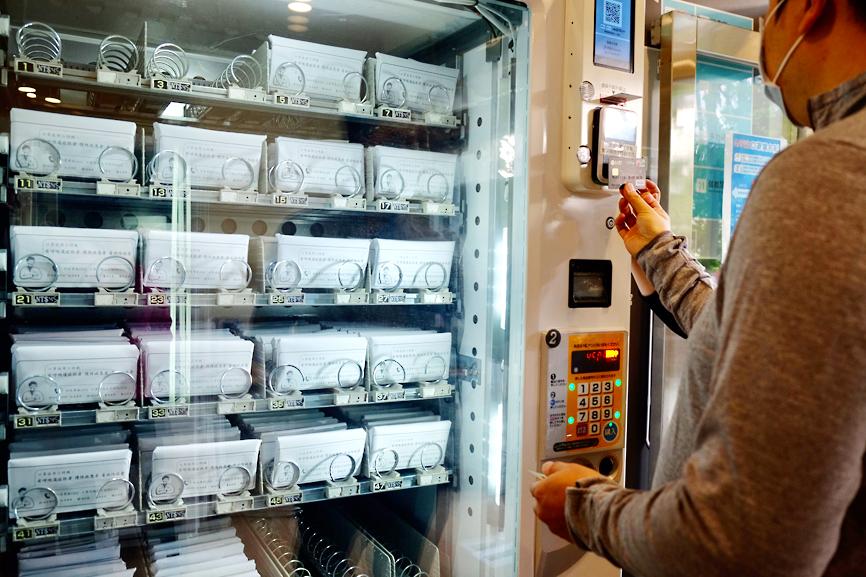Vending machines at the Xinyi District Health Center (信義健康中心) are to continue to sell masks on Sundays, even if pharmacies and local health centers no longer sell them on that day, the Taipei Department of Health said yesterday.
The Central Epidemic Command Center (CECC) on Friday announced that starting today, government-requisitioned masks are not to be distributed to pharmacies and local health centers on Sundays so that their staff can rest one day per week.
The city’s 11 district health centers are to stop selling masks on Sundays, but people can still buy them from the Xinyi District Health Center’s vending machines on Sunday mornings, the department said in a statement about the policy.

Photo: Sam Yeh, AFP
The vending machines are available to the public from 8:30am to 6:30pm on weekdays and 8:30am to 12pm on weekends, it said.
At the vending machines, people must insert their National Health Insurance card — as long as it has not been used to buy masks for two weeks — and then pay with cash, or a mobile payment service, the department added.
The Taipei City Government, in cooperation with the CECC and the National Health Insurance Administration, launched the nation’s first mask vending machines at the Xinyi District Health Center on April 11.
The vending machines are efficient and spare people from the long lines at pharmacies, Taipei Mayor Ko Wen-je (柯文哲) said, adding that machines should be installed at all 12 of the city’s district health centers within a week.
However, on April 12 — the first day — people began lining up as early as two hours before the vending machines became available, and city councilors questioned whether the machines were more efficient, as health center workers had to instruct people on how to use them.
A total of 4,614 batches, or 41,526 masks, were sold from the center’s three vending machines from April 11 to Thursday, the Taipei Department of Information Technology said yesterday.
Most people used the machines on weekday afternoons and bought masks without waiting — the fastest time for buying two batches was 30 seconds, while one-and-a-half minutes was the slowest, it added.

Chinese spouse and influencer Guan Guan’s (關關) residency permit has been revoked for repeatedly posting pro-China videos that threaten national security, the National Immigration Agency confirmed today. Guan Guan has said many controversial statements in her videos posted to Douyin (抖音), including “the red flag will soon be painted all over Taiwan” and “Taiwan is an inseparable part of China,” and expressing hope for expedited reunification. The agency last year received multiple reports alleging that Guan Guan had advocated for armed reunification. After verifying the reports, the agency last month issued a notice requiring her to appear and explain her actions. Guan

The Kaohsiung Tourism Bureau audited six hotels in an effort to prevent price gouging ahead of Korean band BTS’ concert tour in the city scheduled for Nov. 19, 21 and 22 this year. The bureau on Friday said that the audits — conducted in response to allegations of unfair pricing posted on social media — found no wrongdoing. These establishments included the local branches of Chateau de Chine, Hotel Nikko, My Humble House, and Grand Hai Lai, it said, adding that the Consumer Protection Commission would have penalized price gougers had the accusations been substantiated. The bureau said the Tourism Development Act

GIVE AND TAKE: Blood demand continues to rise each year, while fewer young donors are available due to the nation’s falling birthrate, a doctor said Blood donors can redeem points earned from donations to obtain limited edition Formosan black bear travel mugs, the Kaohsiung Blood Center said yesterday, as it announced a goal of stocking 20,000 units of blood prior to the Lunar New Year. The last month of the lunar year is National Blood Donation Month, when local centers seek to stockpile blood for use during the Lunar New Year holiday. The blood demand in southern Taiwan — including Tainan and Kaohsiung, as well as Chiayi, Pingtung, Penghu and Taitung counties — is about 2,000 units per day, the center said. The donation campaign aims to boost

BACK TO WINTER: A strong continental cold air mass would move south on Tuesday next week, bringing colder temperatures to northern and central Taiwan A tropical depression east of the Philippines could soon be upgraded to be the first tropical storm of this year, the Central Weather Administration (CWA) said yesterday, adding that the next cold air mass is forecast to arrive on Monday next week. CWA forecaster Cheng Jie-ren (鄭傑仁) said the first tropical depression of this year is over waters east of the Philippines, about 1,867km southeast of Oluanpi (鵝鑾鼻), and could strengthen into Tropical Storm Nokaen by early today. The system is moving slowly from northwest to north, and is expected to remain east of the Philippines with little chance of affecting Taiwan,